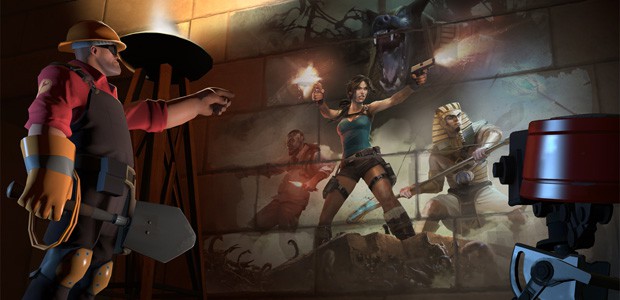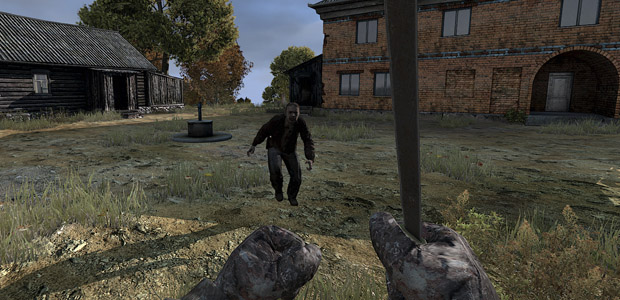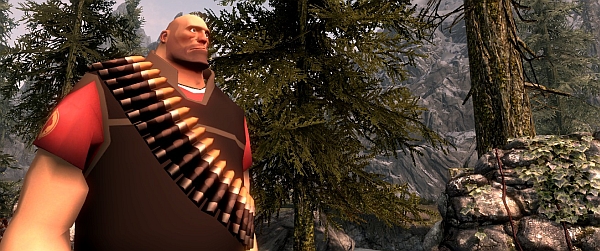Steam Charging For Mods: For And Against
The end of an era
It used to be that the only way to make money from a mod was a) make a standalone sequel or remake b) use it as a portfolio to get hired by a studio or c) back in the pre-broadband days, shovel it onto a dodgy CD-ROM (and even then, it almost certainly wasn't the devs who profited). As of last night, that changed. Mod-makers can now charge for their work, via Steam.
It's far too soon to know the long-term outcome of Valve offering the option for mod creators to charge for their work, which went live yesterday using Skyrim as a test case. Everyone has an opinion, and I'll try to cover the main angles below, but first I simply want to express simple sadness. Not fatalistic sadness - I'm genuinely curious as to how this will play out, and there's high potential for excitement - but End Of An Era sadness.
Mods, free, fan-made modifications or extra content for existing games, have been a part of PC gaming for almost as long as there has been PC gaming. To think that this is changing, in that there may be less availability of free mods, and in that mod teams may now embark on their projects with a mind to earning a living from it rather than purely enthusiasm, is bittersweet. I do want people to be compensated for their work, and I do want people to be able to lay hands on more resources to make their endeavours - so often wilder than anything which would arise from an established studio - better still, as well as potentially receiving more co-operation from the original games' developers. I don't resist this change, but I am misty-eyed for the potential loss of what was. It was always delightful to gaze at all this weird, wonderful, usually broken fare, created from pure love and determination. Mods gave new, extended life and flair to games including Half-Life, Doom and Skyrim, mods lead to DayZ and Team Fortress, mods are as PC gaming as PC gaming gets. I salute them.
In all honesty, it's highly unlike that free mods will go away, not least because it can be hard to make players blindly stump up for unknown quantities, but change is upon us. The gulf between hobbyist and professional is shrinking, and while that means more potential for projects to go off the rails, it also means more potential for new ideas and new voices to reach an audience. In all honesty, I don't not strongly for or against this move, so don't expect a tubthumping THIS IS WHAT HAS TO HAPPEN conclusion. I do want to look at some of the major arguments for and against this new age of paid mods, however.
FOR
Most of all, this is a motivation for people to make this stuff, to make it better, and to be compensated for it. Potentially, it also creates yet more routes into game development that don't involved signing your life away to a big studio or publisher. Additionally, it removes even more barriers from making money from truly out-there stuff: without the same degree of risk as making a game from scratch, this can be the true test of If You Build It, They Will Come.
Someone with a wild idea, someone from a minority background or with an outsider perspective, no longer need necessarily make an entire game, and all the time and financial risk that entails, to put something out in the world. Don't focus on uncomfortable ideas of someone becoming a millionaire from digital hat sales: creators being better able to afford to do something adventurous or elaborate is enormously meaningful here.
We can also look at this as long-overdue tribute to an ethos which has made PC gaming the vibrant, impossibly wide-ranging scene we have today. Without mods we wouldn't have Team Fortress or Dota 2, DayZ or Return To Castle Wolfenstein, Heroes of the Storm or Natural Selection, Counter-Strike or Killing Floor, Dear Esther or League of Legends, Antichamber or Garry's Mod, Red Orchestra or Stanley Parable. And that's just the commercial stuff - factor in wonderful work which never went standalone or paid, such as Civ IV: Fall From Heaven, Action Half-Life, XCOM: The Long War, Action Quake 2, Complex for Homeworld 2, Game of Thrones for Crusader Kings 2, The Third Age for Medieval 2, Just Cause 2 multiplayer, the endless community patches for Vampire: The Masquerade - Bloodlines... There are so many others, and we should celebrate them below, but in any case - it only feels right to now be rewarding that scene, to encourage it to new heights.
Potentially, money means more updates, better support, more scope and scale, more longevity, more potential for mod teams to move onto bigger and better things. Something as simple as being able to hire an artist, writer or actor can make all the difference between so-so and fantastic, for instance. All that said, there are a great many mods which have been updated and improved for years based on nothing but dedication and goodwill. I don't think it's at all true to say there is a need to move to a payment model, but it may open more doors for more people.
It's worth noting as we talk about money that, in the case of Skyrim, mod-makers will receive just a 25% revenue share of whatever they sell their creation for, so apart from in rare cases this is unlikely to be a path to riches. While there's certainly an argument to be made that the teams who make this stuff are getting a raw deal out of this new scheme, at least hopefully it will prevent people getting into mods purely with money on their mind. The option to be free remains, naturally, plus Valve have added a particularly intriguing Pay What You Want system (which I have little doubt will later be expanded to full games, as an attempt to take on Humble), so we're not at all looking at a paywall being erected around mod-town.
The 25% sum is proving contentious, inevitably. I don't have a dog in this race myself, but what I do hope is that, whatever the norm ends up being, it leads to more publishers being more open about their games being modded. Many big games are effectively locked down, either because the work to include any sort of mod tools wasn't considered worthwhile or - in the recent example of GTA V - concerns that the integrity of the intended experience would be undermined. (Another way of putting that is money-men worrying that some amateurish mod makes their company's project look bad, or that a more popular mode would pull players out of an intended walled garden). I wouldn't be at all surprised if some individual developers were simply sniffily resistant to others changing their work. If putting money on the table means more games can have more mod support, for that reason alone I'm in comfortable with this move.
Related to this is other rights-holders permitting rather than cracking down on mods. What if all those copyright-ignoring boardgame adaptations released for Tabletop Simulator would be legalised, either by giving a cut to Fantasy Flight or whoever, or simply tempting Fantasy Flight or whoever (including indie boardgame designers) to release their own adaptations for it? What if SyFy or Lucasarts officially OKed the Battlestar and Star Wars mods that so many people cry out for, even if it came down to them taking every penny of profit? There's a great deal of potential, but it's potential both to crack open the hitherto unyielding shell of copyright and to outright fleece well-intentioned fans.
Which brings us onto some of the reasons this mightn't be such a happy turn of events.
AGAINST
There are potentially huge downsides to paid mods, many of which relate to Steam itself. Valve has a propensity to hurl its new schemes into the lion's den that is its own community and see what happens, not always taking an active hand in managing things which millions of people look at. Though they just about fall more into helping than hindering, Greenlight and Steam Curators still seem like cobbled-together half-solutions to discoverability problems, Steam Tags and the Workshop are rife with stuff which sails close to the wind, and generally there's this sense of ramshackle lawlessness.
The mod scene is lawless enough as it is already, be it ripping off other creators, borrowing liberally from other IP or falling apart due to in-fighting: adding money, and a direct pipe onto the firehose that is Steam, into the equation is a fearsome prospect. On the other hand, item sales for Dota and Steam Workshop have successfully become their own economy, and been very profitable for some creators. With a careful hand, easy access and plenty of support, this is do-able: we just have to hope that Valve has gone into it with a determination to make it work rather than a Que Sera Sera mindset.
There's also this concern that Valve are bringing yet more of PC gaming under their already monopolistic roof. Mods have long been their own weird, ungoverned splinter cell, but moving to a paid model (though again, this is completely optional, plus there's no guarantee that many mods will move away from their own homes or Moddb and into Steam's arm) means that the PC games ecosystem is all the more defined by Steam. It's been happening for a little while already, of course- the Workshop for Skyrim stole Nexusmods' thunder, while dramatic tweaking of Cities: Skylines doesn't ever require leaving Steam's interface. This potential to make a mod lucrative as well as popular may well seal the deal that Steam is now the place to be. Other sites and providers may suffer, and many projects' fate will be at the whim of Steam's discoverability tools.
Another contentious issue about this move is, as mentioned in the For column, how much share the original game's rights-holders will take of a mod's sales. Valve confirm that this is going to vary on a case by case basis, so let's not get ahead of ourselves here, but for Skyrim mod-makers get 25%, with the remaining 75% being split between Valve and Skyrim publisher Bethesda. 75% is a lot. Too soon to say if this is a precedent, but I doubt big publishers will want to take less if they don't have to. Some feel this is too much to the IP owners and platform holder, given the work was done by the modders and that in some cases mods sell games rather than vice-versa, while others feel it's only fair given that the mods wouldn't exist were it not for the game, as well as pointing out that, by other industries' standards, those are generous licensing terms.
One more question mark hanging over this concept is whether players will be willing to pay in the first place. The mercenary froth of DLC and in-app purchases lying atop latter-day mainstream gaming suggests yes, but in this case we're talking about far more unknown quantities. A mod isn't coming from an official source (though isn't the idea of developers making new stuff for each other's games very appealing?), therefore there's no guarantee of quality, on either an artistic or technical level. Steam's trying to counter that right out the gates to some degree by offering a 24 hour window for refunds if "a mod is broken or doesn’t work as promised", but even so, some may feel they're essentially gambling their money. 24 hours won't cover a promised update never happening, brokenness won't cover a mod being unspeakably awful - and there's far more scope for an amateur project to be unspeakable awful than there is for a professionally-made game (in theory).
This is not to mention that essentially paygating a mod will, initially a least, limit the size of its audience. Would the original DOTA or Counter-Strike have become as huge as they did if they weren't free for anyone to suck it and see, with more players coming in as word of mouth spread far and wide? Is this really a new age of ambitious total conversions, or an end to it in favour of nickel'n'diming minor add-ons?
There also tall hurdles to leapt in terms of the mod scene's propensity to cannibalise itself or borrow assets without permission, for the Steam userbase's broad expectation that developers will provide technical support and communication, for what happens if a work-in-progress mod grinds to an unfinished halt because someone lost interest or there wasn't enough money, for how on Earth to sort out ex-team members resurfacing and demanding a cut of a free mod that's now paid.
Fortunately, we are already seeing early signs of Valve's plans for community-led policing of problems as they arise - a paid Skyrim mod which used content from someone else's work has today been pulled. It's too soon to know if such rapid respond will be the norm, especially given how difficult it can be to ascertain what is and isn't original out in modland, but at least it's not a 'hey, whatever' shrug right off the bat.
As I say, I don't incline strongly one way or another, but I am fascinated to see how it works out, as one of the touchstones of PC games moves into a new era. Maybe the uncertainty and contention around it is entirely in keeping with the PC long being gaming's wild west, forever heading to new frontiers while other platforms settle down. Potentially, this is a huge and disruptive change, and things may go horribly wrong, but change is what makes PC gaming PC gaming. Let's see what happens.
Opening image from paid Skyrim mod Lambda Locator.















